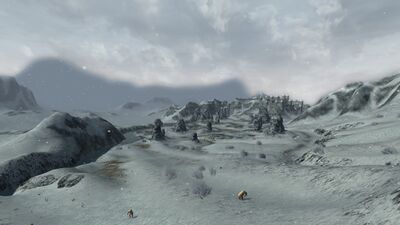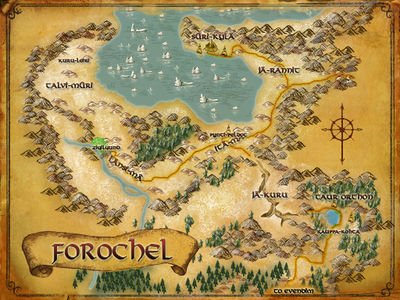Länsi-mâ
| Region: | Forochel |
| Landmark(s): | Barad Gaurhoth Icereave Mines Kissa-sari Norsu-hauta Norsu-leiri Peikko Cave 4th Dwarf Channel 7th Dwarf Channel 10th Dwarf Channel |
| Settlement(s): | Zigilgund |
| Connecting Area(s): |
Itä-mâ Talvi-mûri |
| Levels: | Mainly 46 - 50 |
| Resource tier: | Master |

Länsi-mâ is an area within Forochel in the western region.
This area lies between Itä-mâ and Talvi-mûri, and between the south-western shorelines of the Ice Bay of Forochel and one of the three contributories to river Lhûn that eventually is flowing south past Ered Luin and beyond. Throughout the area are found elks, gauredain, ice-bears, and mammoths, and in the north-western section are hot springs with many worms. At Norsu-leiri are daily quests available for improved standing with the Lossoth.
Historically this area was a prosperous mining centre with many mines around the area, but it was deserted long ago and only recently the Longbeards have taken the frost-bitten ruins of Zigilgund into use again. However, also Dourhands have returned and settled down in some nearby mines, where king Arvedui of Dúnadan hid long since with his men, escaping Fornost and Angmar's wrath.
Zigilgund is an outpost with dwarves, a Lossoth hunter, and a burgled Burglar. Here travellers will find basic services such as a Stable-master, Milestone, Mailbox and a Forge. There are also a Healer and a Supplier & Provisioner, as well as many quest givers and a Burglar Trainer who has lost his Fellowship as well as his own belongings.
Settlements
The following settlements are found within this area:
Landmarks
These landmarks are located within Länsi-mâ:
- Norsu-leiri - camp with reputation quests
- Barad Gaurhoth
- Icereave Mines
- Kissa-sari
- Norsu-hauta
- 4th Dwarf Channel
- 7th Dwarf Channel
- 10th Dwarf Channel
Dungeons
- Peikko Cave
- Bregmor's Den - quest only
NPCs
See list of all NPCs within Länsi-mâ
Quests
See "starting quests" and the landmarks for more quests
Involving:
- [49] Exiles of Winter
- [50] Articles of Harmony - Minstrel
- [50] Implements of the Hunt - Hunter
- [50] Implements of Knowledge - Lore-master
- [50] Implements of the Night - Burglar
- [50] Implements of War - Captain
- [50] A Worthy Garment - Rune-keeper
Mobs
The following creatures are found within this area:
- Angmarim Sorcerer
- Bryok, Spear-master
- Gauradan Hunter
- Gauradan Seer
- Gauradan Thief
- Great Gauradan Chief
- Great Hoary Aurochs
- Helchuan
- Paha-peto
- Raivo-kaihu
- Ringdagnir
- Shivering Grim
- Steppe-elk Hart
- Steppe-elk Hind
- Torahammas
- Tundra Bear
- Winter-worm
- Bryok, Spear-master
- Silver Hare
- Winter Fox
Maps
Lore
- In Finnish Länsi-mâ means "West Land"; the letter â does not exist but it represents the double "a" which gives "maa" ("land") and "itä" means "west".
| Settlements, Areas and Landmarks of Forochel
| ||
|---|---|---|
| Areas: | Itä-mâ • Jä-kuru • Jä-rannit • Länsi-mâ • Talvi-mûri • Taur Orthon | |
| Settlements: | Kauppa-kohta • Kuru-leiri • Pynti-peldot • Sûri-kylä • Zigilgund | |
| Landmarks: | 4th Dwarf Channel • 7th Dwarf Channel • 10th Dwarf Channel • Barad Gaurhoth • Hammastus-pesä • Hylje-leiri • The Ironspan • Jotunstath • Jä-reitti • Jänis-leiri • Karhu-leiri • Kibilzahar • Kissa-sari • Korkea-järvi • Leijona-kotin • The Lonesome Stones • Metsästä-sija • Norsu-hauta • Norsu-leiri • Pynti-leiri • Reodh Fuil • Skirmish Camp • Tûli-mäit • Vesi-paistâ • Voi-teltta | |
| Interiors: | Great Lodge of Sûri-kylä • Näky-kolo | |
| Dungeons: | Icereave Mines • Peikko Den | |
| Instances: | World Instances: Agoroth, the Narrowdelve • Sâri-surma / Skirmish: The Icy Crevasse / Quest Instances: Bregmor's Den • Halla-kolo • Kolo-hampât | |

